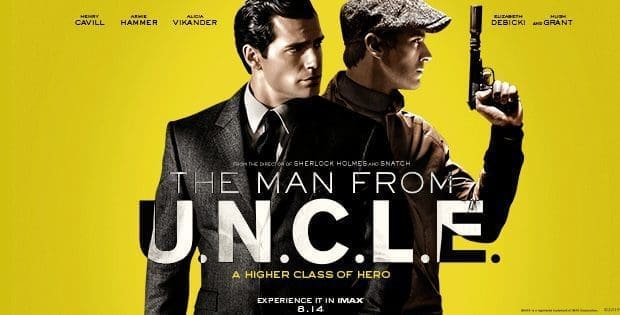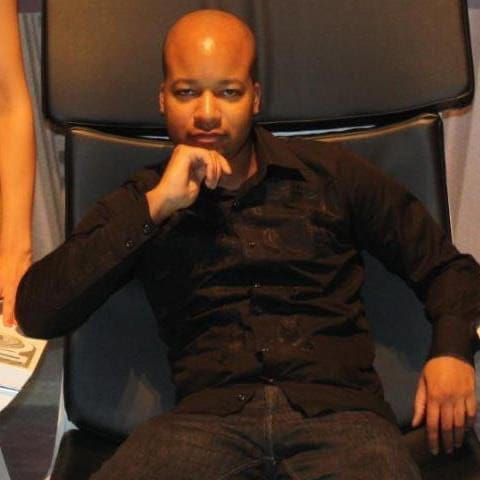Guy Ritchie has a certain cinematic flair to his films. Snatch, Sherlock Holmes and Lock, Stock and Two Smoking Barrels all have a unique look and feel that few other filmmakers can’t seem to replicate. Ritchie’s latest endeavor, The Man from U.N.C.L.E. has a very familiar artistic flair, but it feels as though Ritchie has finally grown up. It almost feels like a more sophisticated version of his previous films.
The film is a prequel to the television series than ran for four seasons back in the 1960s. It stars Henry Cavill as Napoleon Solo of the CIA, and Armie Hammer as Illya Kuryakin of the KGB. The two spies must work together at the height of the Cold War on a mission to stop a nuclear threat from becoming a reality.
The character of Napoleon Solo was created by Ian Fleming to be a small screen version of James Bond, and Cavil plays this part to a tee. He’s everything you’d expect from James Bond, only with a bit more finesse, especially compared to the more rugged James Bond of the recent films. He’s a smooth and charming ladies man, while still able to kill a man instantly if the need arises.
On the other end of U.N.C.L.E. you’ve got Kuryakin who has more in common with the famous Bond villain Jaws than James Bond himself. That’s not to say Kuryakin isn’t one bit as deadly as Solo, but he lacks the finesse and smooth mannerisms. The two play off of each other very well, as many of the best scenes in the film are when the two are interacting.
While the stars of the movie offer impressive performances, it’s Ritchie’s stylized filmmaking and Daniel Pemberton’s impressive score that really draws you in. The cuts during and between scenes, and the soft visual look of the film not only take you back to the 60s, but it makes you feel as though you’re living the 60s in modern times. This isn’t just a direct copy of what a 60s film would look like that so many directors have done recently. You won’t find any screening tearing or dust artifacting. The film looks like it was made in 2015, but with the style and feel of the 60s.
The music plays a big role in the film as well. Much like Christopher Nolan used Hans Zimmer’s score in Interstellar, Ritchie uses Pemberton’s score as if it were another actor. Sometimes the music drowns out the voices in the film, and other times it simply complements the scene, but every time you hear music it feels as though there’s a purpose behind it.
At one point Solo and Kuryakin are separated, with Solo relaxing with a nice sandwich and Kuryakin caught in a deadly chase. The music shifts from epic and daring during the first part of the chase, to calm and soothing when we shift to Solo. It’s rare to find a film score that really feels like another character in a movie, but that’s exactly what has happened with U.N.C.L.E.
There are several twists and turns throughout the film, but it’s a fun ride the entire time. The pacing is excellent as there’s very little down time, and even when things slow down a bit, it feels natural. Watching the film may remind older viewers of the classic Get Smart TV series. It’s a very Bond-like experience, but with far more humor and overall fun. Nothing feels forced, setup or overly convenient, everything just works well and comes together for a great viewing experience.
The Man from U.N.C.L.E. did have a few cliché moments that are typical of the spy genre, but overall it was a very satisfying film. It offers enough romance, action and humor to thrill almost any moviegoer, and should be experienced in IMAX for the sound mixing alone.
The Man from U.N.C.L.E.:[usr 4]
About The Man from U.N.C.L.E.
Synopsis: In the early 1960s, CIA agent Napoleon Solo and KGB operative Illya Kuryakin participate in a joint mission against a mysterious criminal organization, which is working to proliferate nuclear weapons.
Director: Guy Ritchie
Writers: Guy Ritchie, Lionel Wigram
Stars: Henry Cavill, Armie Hammer, Alicia Vikander
Rated: PG-13
Runtime: 116 Minutes
Bryan Dawson has been writing professionally since the age of 13. He started his career as a video game writer and has since worked for Random House, Prima Games, DirecTV, IGN, AOL, the British Government, and various other organizations. For GNN, Bryan taps into his passion for movies.






























